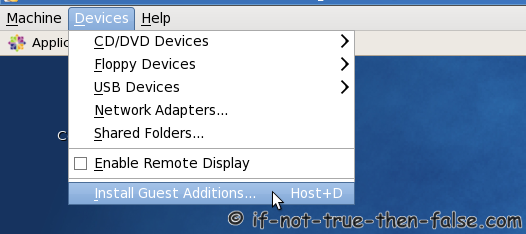This is guide, howto install Oracle VirtualBox Guest Additions on Fedora, CentOS and Red Hat (RHEL). This guide should work with Fedora 26/25/24/23/22/21/20/19/18/17/16, CentOS 7.3/6.9/5.11, Red Hat (RHEL) 7.3/6.9/5.11.
VirtualBox Guest Additions is special software that can be installed inside Linux virtual machines to improve performance and make integration much more seamless. Among the features provided by these VirtualBox Guest Additions are mouse pointer integration and arbitrary screen solutions (e.g. by resizing the guest window).
Install VirtualBox Guest Additions on Fedora, CentOS and Red Hat (RHEL)
1. Change root user
Bash
su -
## OR ##
sudo -i
2. Make sure that you are running latest kernel
Update virtual machine kernel and reboot
Bash
## Fedora 26/25/24/23/22 ##
dnf update kernel*
## Fedora 21/20/19/18/17/16, CentOS/RHEL 7/6/5 ##
yum update kernel*
reboot
3. Mount VirtualBox Guest Additions
Click Devices > Install Guest Additions… on VirtualBox

Mount VirtualBox Guest Additions device
Bash
mkdir /media/VirtualBoxGuestAdditions
mount -r /dev/cdrom /media/VirtualBoxGuestAdditions
4. Install following packages
On CentOS/Red Hat (RHEL) 7/6/5, EPEL repo is needed
Bash
## CentOS 7 and Red Hat (RHEL) 7 ##
rpm -Uvh https://dl.fedoraproject.org/pub/epel/epel-release-latest-7.noarch.rpm
## CentOS 6 and Red Hat (RHEL) 6 ##
rpm -Uvh https://dl.fedoraproject.org/pub/epel/epel-release-latest-6.noarch.rpm
## CentOS 5 and Red Hat (RHEL) 5 ##
rpm -Uvh https://dl.fedoraproject.org/pub/epel/epel-release-latest-5.noarch.rpm
Install following packages
Bash
## Fedora 26/25/24/23/22 ##
dnf install gcc kernel-devel kernel-headers dkms make bzip2 perl
## Fedora 21/20/19/18/17/16/15/14/13/12, CentOS/RHEL 7/6/5 ##
yum install gcc kernel-devel kernel-headers dkms make bzip2 perl
If you have CentOS/RHEL 6.7 then check this comment. You need older kernel.
5. Add KERN_DIR environment variable
Bash
## Current running kernel on Fedora, CentOS 7/6 and Red Hat (RHEL) 7/6 ##
KERN_DIR=/usr/src/kernels/`uname -r`
## Current running kernel on CentOS 5 and Red Hat (RHEL) 5 ##
KERN_DIR=/usr/src/kernels/`uname -r`-`uname -m`
## Fedora example ##
KERN_DIR=/usr/src/kernels/2.6.33.5-124.fc13.i686
## CentOS and Red Hat (RHEL) example ##
KERN_DIR=/usr/src/kernels/2.6.18-194.11.1.el5-x86_64
## Export KERN_DIR ##
export KERN_DIR
6. Install Guest Additions
Bash
cd /media/VirtualBoxGuestAdditions
# 32-bit and 64-bit systems run following
./VBoxLinuxAdditions.run
Output looks like following:
[root@fedora VBoxGuestAdditions]# ./VBoxLinuxAdditions.run Verifying archive integrity... All good. Uncompressing VirtualBox 4.1.6 Guest Additions for Linux......... VirtualBox Guest Additions installer Removing installed version 4.1.6 of VirtualBox Guest Additions... Removing existing VirtualBox DKMS kernel modules [ OK ] Removing existing VirtualBox non-DKMS kernel modules [ OK ] Building the VirtualBox Guest Additions kernel modules Building the main Guest Additions module [ OK ] Building the shared folder support module [ OK ] Building the OpenGL support module [ OK ] Doing non-kernel setup of the Guest Additions [ OK ] You should restart your guest to make sure the new modules are actually used Installing the Window System drivers Installing X.Org Server 1.11 modules [ OK ] Setting up the Window System to use the Guest Additions [ OK ] You may need to restart the hal service and the Window System (or just restart the guest system) to enable the Guest Additions. Installing graphics libraries and desktop services componen[ OK ]
7. Reboot guest system
Bash
reboot
Then VirtualBox Guest Additions install is ready.